Key takeaways:
- Pandemic-related stress stems from uncertainty, isolation, and changes in routine, leading to significant emotional and physical reactions.
- Recognizing personal stress triggers is essential for effective management; keeping a journal can help identify patterns and sources of anxiety.
- Incorporating mindfulness practices, such as deep breathing and meditation, along with creative outlets, can significantly alleviate stress and improve mental well-being.
- Building a support network, both with familiar people and online communities, fosters deeper connections and shared coping strategies during challenging times.
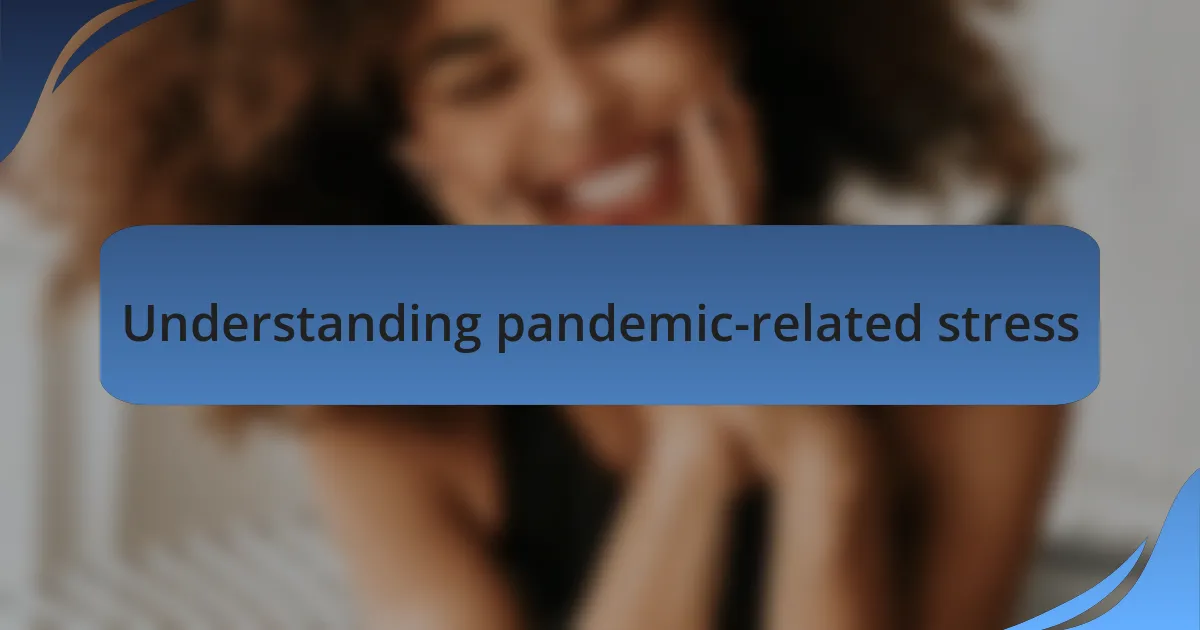
Understanding pandemic-related stress
Pandemic-related stress is a unique phenomenon that many of us have felt ever since the world shifted. I still remember the palpable anxiety when the news flashed about lockdowns; it was as if the ground had shifted beneath my feet. Does this sound familiar? That overwhelming feeling of uncertainty and loss of control can easily lead to significant emotional distress.
There are moments when I catch myself staring into space, my mind racing with thoughts about health, work, and family. The isolation felt immensely heavy at times, amplifying feelings of loneliness. This experience made me realize that stress isn’t just a mental burden; it manifests physically, making my heart race or my stomach twist in knots.
Understanding the root causes of this stress is crucial for coping effectively. Everything from the fear of illness to the disruption of daily routines plays a role. Have you found yourself feeling exhausted after a simple conversation? That’s no coincidence. It’s crucial to acknowledge these feelings as valid indicators of how profoundly the pandemic has impacted our mental health.
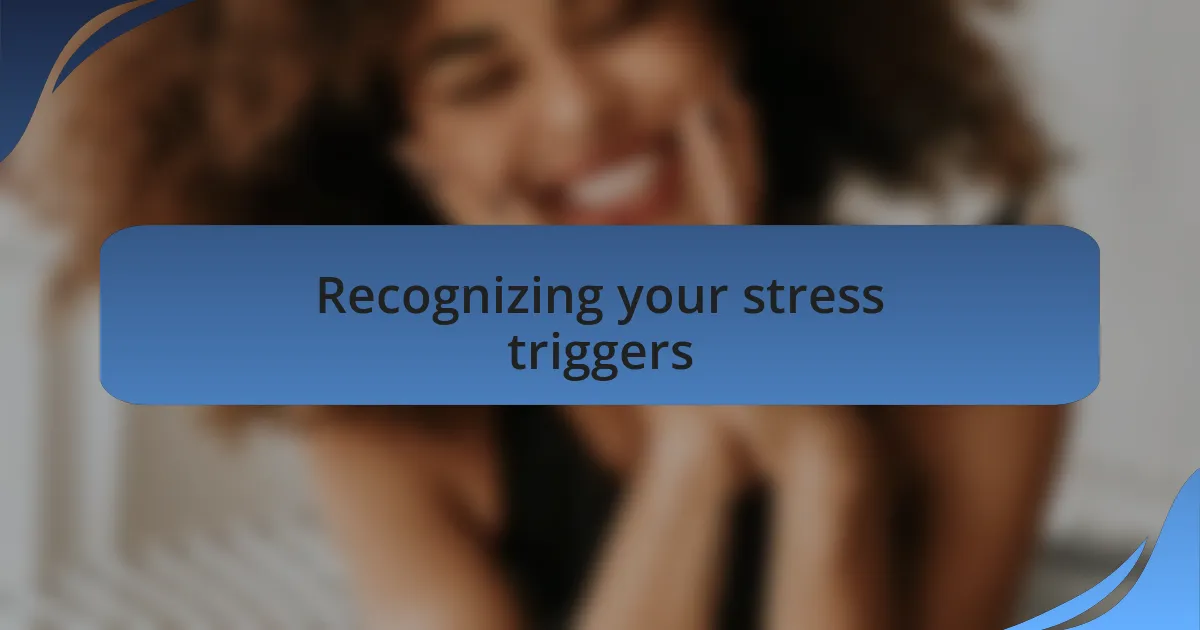
Recognizing your stress triggers
Recognizing stress triggers is a vital step in managing pandemic-related stress. I recall a time when a simple trip to the grocery store would leave me feeling overwhelmed, heart racing as I navigated through aisles filled with people. It made me realize how certain environments could suddenly trigger a cascade of anxiety. Have you noticed particular situations that evoke a similar response?
When I began to pay attention to my emotional reactions, it became clear that changes in routine were significant stressors for me. Missing my usual coffee shop visits turned into feelings of restlessness and nostalgia. I started to record these moments in a journal, uncovering patterns that highlighted how much I craved structure in my day-to-day life. What triggers have you identified that disrupt your peace?
Sometimes, even small things can catch me off guard; for instance, seeing headlines about rising case numbers or new restrictions can take me right back to that initial panic during lockdowns. It’s intriguing how certain stimuli can reignite that sense of fear. Recognizing these triggers isn’t just about being aware; it’s also about acknowledging their impact and learning how to navigate them effectively in our lives.

Effective stress management techniques

Effective stress management techniques
One technique that has really helped me is deep breathing exercises. In moments of heightened stress, I take a few minutes to focus on my breath, inhaling deeply through my nose and exhaling slowly through my mouth. It’s amazing how just a few breaths can restore my calm and bring clarity back to my thoughts. Have you tried this simple method when anxiety strikes?
Another approach I’ve adopted is incorporating regular physical activity into my routine. I found that even a brisk walk around my neighborhood helps clear my mind and boost my mood. There were days when I really didn’t feel like exercising, yet forcing myself out the door often led to surprising moments of joy in the fresh air. How has movement affected your stress levels?
Lastly, I turned to creative outlets like painting and writing. These activities became my safe spaces—allowing me to express emotions I struggled to verbalize. I remember starting a small art project during lockdown that transformed my feelings of confinement into bursts of creativity. It’s fascinating how creativity can serve as therapy; what hobbies have helped you cope with stress during these challenging times?
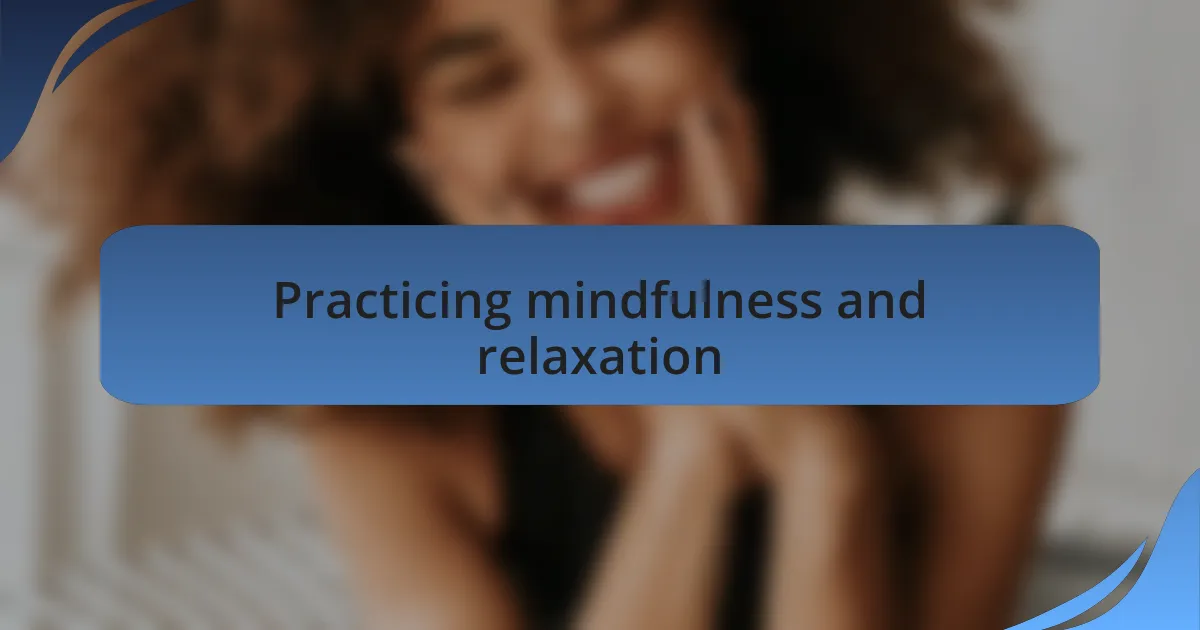
Practicing mindfulness and relaxation
One mindfulness practice I’ve found particularly beneficial is guided meditation. Initially, I was skeptical, but I decided to give it a go during one particularly overwhelming week. Listening to a soothing voice guide me through relaxation techniques helped me center my thoughts and create a sense of peace. Have you ever experienced that profound shift in your mindset simply by taking a few moments to be still?
In addition to meditation, I’ve learned to appreciate the power of nature sounds. Whether it’s the sound of gentle rain or a crackling fire, these auditory experiences ground me in the present moment. I often listen to these sounds while working or unwinding in the evening, and they transport me to a tranquil place, easing away the stresses of the day. What ambient sounds resonate with you when you need to relax?
Moreover, I found that simply dedicating a few minutes each day to savor my morning coffee can be a small but impactful mindfulness exercise. I take the time to notice the aroma, the warmth of the mug in my hands, and the taste as it fills my senses. This mindful drinking transforms a mundane routine into a moment of gratitude and presence. Have you taken a moment to be mindful of simple pleasures in your daily life?
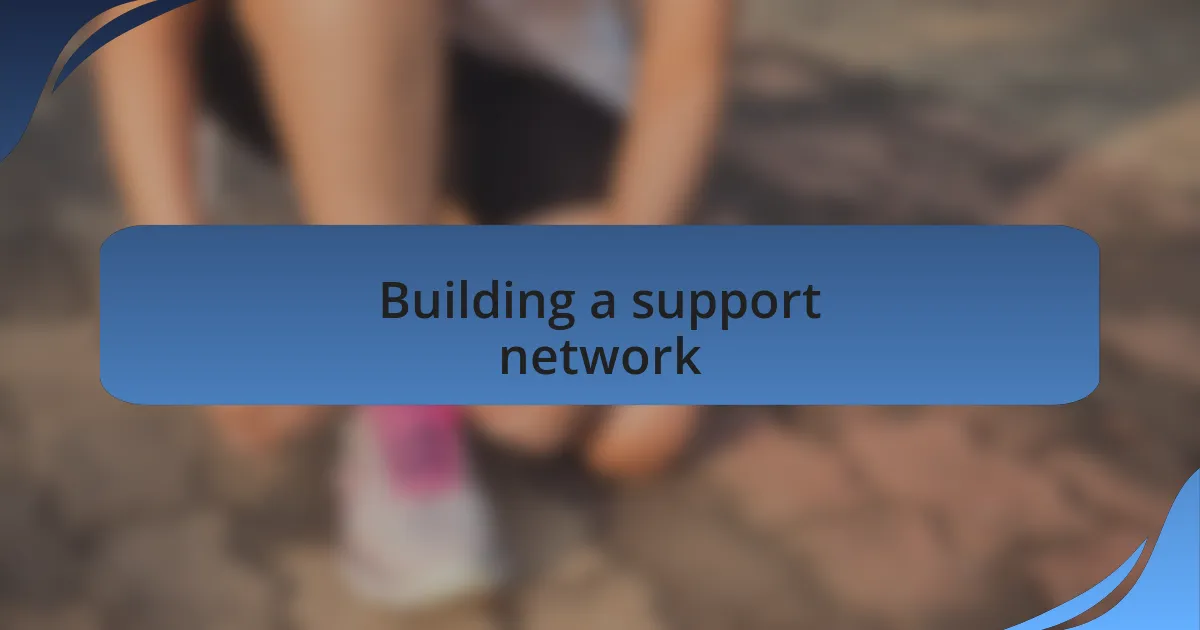
Building a support network
Building a support network isn’t just a practical step; it’s a lifeline. I remember feeling isolated at the height of the pandemic, grappling with anxiety that seemed to spiral out of control. It was the moment I reached out to friends and family, establishing a regular check-in system, that I felt a shift. How often do you connect with your loved ones for emotional support?
Creating this network required vulnerability on my part, something I initially resisted. But sharing my feelings, even on tough days, opened doors to deeper connections, as others shared their struggles too. The realization that we were facing similar challenges forged a bond that now feels like a safety net. Have you considered that opening up could strengthen your ties to others?
Moreover, I found value in expanding my network beyond familiar faces. Online groups became a treasure trove of shared experiences and diverse coping strategies. Engaging in discussions with individuals I’d never met in person illustrated that support can come from unexpected places. Isn’t it fascinating how technology has transformed our ability to connect, making support accessible even in isolation?
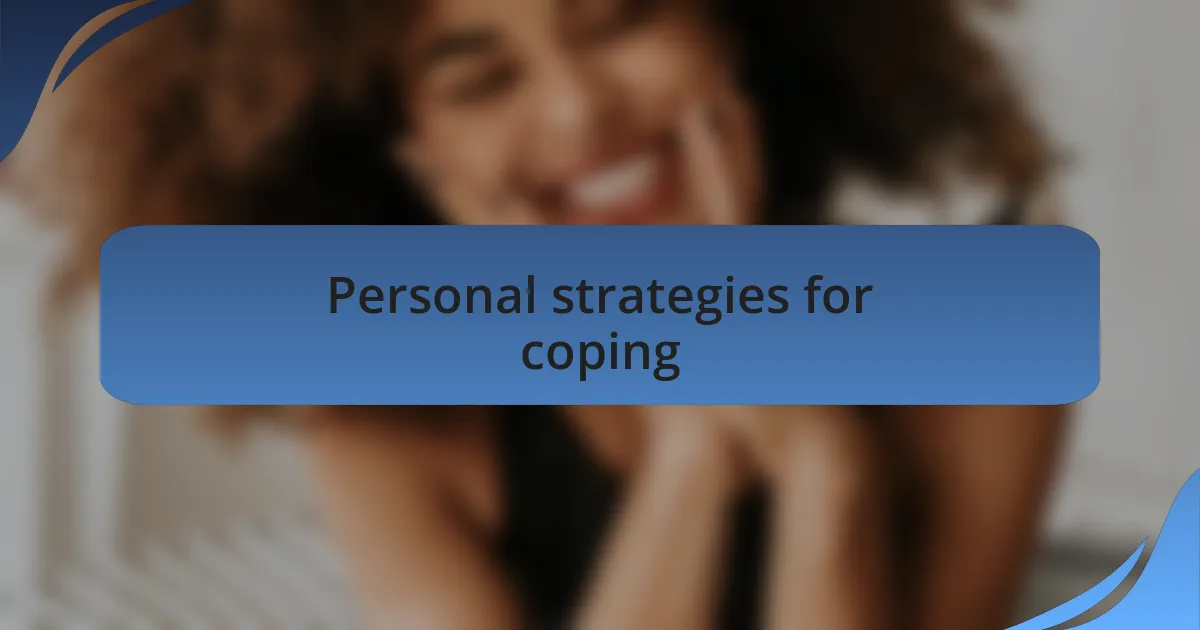
Personal strategies for coping
Managing pandemic-related stress often required me to tap into specific strategies that worked for my mindset. I found that establishing a daily routine helped me regain control amidst the chaos. When I committed to a structured schedule, from morning workouts to dedicated work hours, I noticed an improvement in my mood. Have you thought about how a simple routine could anchor your day?
Mindfulness practices became another cornerstone for me. I began incorporating meditation into my morning routine, which, at first, felt challenging. Yet, as I persevered, the moments of stillness allowed me to process my emotions and release tension. I vividly recall a day when just five minutes of focusing on my breath transformed my anxiety into calm. Have you explored how mindfulness can create moments of peace in your hectic life?
Additionally, I discovered the power of creative expression. When the world felt heavy, picking up a paintbrush or writing in my journal offered an outlet for my emotions. I vividly remember creating a piece that reflected the uncertainty I felt; pouring my heart onto the canvas lifted a weight I didn’t even realize I was carrying. What creative outlets have you considered to express your feelings during these turbulent times?